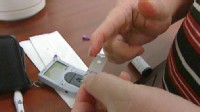Gastric Bypass Surgery Can Reverse Diabetes Woman using a blood sugar monitor. Doctors have discovered when it comes to weight loss surgery for diabetics, gastric bypass surgery reverses the disease before the patients lose the weight. (Tetra Images/Getty Images)
- /
+ By
RICHARD BESSER (
@DrRichardBesser) , LANA ZAK and BEN FORER March 28, 2011
Surgery should be considered as a treatment for obese patients with diabetes, according to a position statement released today by the International Diabetes Federation.
Doctors have made a significant discovery: When it comes to weight-loss surgery for diabetics, gastric bypass surgery reverses the disease before the patients lose the weight.
"It's not uncommon for a patient to be on 100 units of insulin a day, so they're injecting themselves three or four times a day, and before they leave the hospital, they will never use insulin again," said Phil Schauer, director of the Cleveland Clinic Bariatric and Metabolic Institute. "For that patient, it must be an absolute miracle."
Gastric bypass surgery works by reducing the size of the stomach so a person can't eat as much and shortening the length of the intestine so that the body doesn't absorb too many calories. But it might also have the side effect of normalizing blood sugar.
"The fast effectiveness is due to, we think, an elaboration of hormones made by the intestines," Schauer said. "These are called incretins and these are dramatically increased after surgery in hours or days.
Tetra Images/Getty Images Woman using a blood sugar monitor. Doctors...
View Full Size Tetra Images/Getty Images Woman using a blood sugar monitor. Doctors have discovered when it comes to weight loss surgery for diabetics, gastric bypass surgery reverses the disease before the patients lose the weight.

Diabetes in America
Watch Video 
What is Gestational Diabetes?
Watch Video 
Juvenile Diabetes
Watch Video "These hormones stimulate the pancreas to make more insulin. And that's thought to be the underlying problem with type 2 diabetes."
Katy Wiley suffered from diabetes for 16 years.
"It was horrible, diabetes controlled my life," she said. "I had to watch what I ate, I had to eat at a certain time, I had to take a shot at a certain time. It affected me, it affected my family. My family's schedule had to revolve around me, and I was so worried that I was going to die."
Wiley was 5-feet 2-inches and and weighed 198 pounds. But as with many diabetics on insulin, dieting was difficult and exercise was painful.
"I was obese, and I didn't have the motivation," she said. "I was tired all the time from my blood sugar being extremely high.
"My knees ached, my body ached, I would get breathless if I would take a walk. I tried very hard."
Soon after gastric bypass surgery, Wiley was off insulin, even before losing 75 pounds. Now she's saving thousands of dollars in medical costs and has gone from 180 shots a month to none. She is also working out everyday.
Diabetes Organization Advocates Surgery as Treatment The International Diabetes Federation's recommendation might apply to more than 15 million people who have type 2 diabetes and are struggling with obesity.
But Ann Albright, director of the Division of Diabetes and Translation at the Centers for Disease Control and Prevention, cautions that surgery should not be the first option.
"You would not likely go to surgery initially, attempts should be made to manage type 2 diabetes with nutrition and physical activity first," she said.
"Then you would [take] medications as necessary, and if you still are not able to reach your treatment goals for those for which it is appropriate, surgery should be considered."